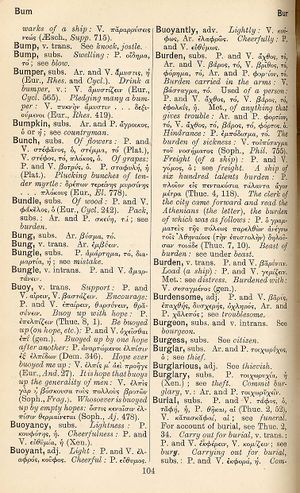burden
Οὕτως γὰρ ἠγάπησεν ὁ Θεὸς τὸν κόσμον, ὥστε τὸν Υἱὸν τὸν μονογενῆ ἔδωκεν, ἵνα πᾶς ὁ πιστεύων εἰς Αὐτὸν μὴ ἀπόληται ἀλλ᾽ ἔχῃ ζωὴν αἰώνιον → For God so loved the world that he gave his only begotten Son that whosoever believeth in him should not perish but have everlasting life (John 3:16)
English > Greek (Woodhouse)
substantive
P. and V. ἄχθος, τό, Ar. and V. βάρος, τό, V. βρῖθος, τό, φόρημα, τό, Ar. and P. φορτίον, τό.
burden carried in the arms: V. βάσταγμα, τό.
Used of a person: P. and V. ἄχθος, τό, V. βάρος, τό, ἐφολκίς, ἡ.
Met., of anything that gives trouble: Ar. and P. φορτίον, τό, V. ἄχθος, τό, βάρος, τό, φόρτος. ὁ.
the burden of sickness: V. τοὐπίσαγμα τοῦ νοσήματος (Soph., Philebus 755).
freight (of a ship): P. and V. γόμος, ὁ; see freight.
a ship of six hundred talents burden: P. πλοῖον εἰς πεντακόσια τάλαντα ἄγον μέτρα (Thuc. 4, 118).
the clerk of the city came forward and read the Athenians (the letter), the burden of which was as follows: P. ὁ γραμματεὺς τῆς πόλεως παρελθὼν ἀνέγνω, τοῖς Ἀθηναίοις (τὴν ἐπιστολὴν) δηλοῦσαν τοιάδε (Thuc. 7, 10).
beast of burden: see under beast.
verb transitive
load (a ship): P. and V. γεμίζειν.
Met.: see distress.
burdened with: V. σεσαγμένος; (gen.).

